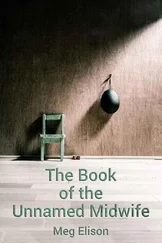He limped out from the trees. She brushed his backside of ice and crumbled leaves. He looked down the road. “Here comes Barb Miller,” he said.
The car was angled into the street on the wrong side of the road, as if it had swerved to avoid an accident. They stood still as deer and watched their neighbor approach. Barb slowed the SUV and powered down the window.
“Everything okay?” she asked. Her words formed white plumes of smoke in the cold air. Butch Miller sat beside her.
“Oh, everything’s fine,” said Jane. “Everything’s fine. Just something with the car.”
Butch leaned over and waved. “Hello,” he said through the window.
“Hello, Butch,” said Tim.
“Do you need us to call someone?”
“No, no. Triple A is on its way, thank you.”
“Thanks, Barb,” said Tim.
“Do you want a ride back to the house? You can’t stay out here, can you?”
“They promised to be here any minute,” said Jane.
Barb smiled and said okay. They waved good-bye and she started the car rolling again. Butch turned his head and they could see him continue to stare through the tinted windows. They watched the SUV dip and disappear out of sight. Then they exchanged a look that conveyed their shared exhaustion. Triple A? Could they really be at it again? The futility of communicating their predicament to the Millers had turned their kind gesture of help into something onerous and unwanted. To approach the world with evasion and thanklessness — that was no way to live. Jane walked around to the driver’s side and she and Tim got in and closed their doors at the same time.
They drove home. Soon after Jane killed the engine, the car began to crackle in the silent garage. “I have to go in,” he said.
She was surprised. He had shown such resolve the night before: no gerbil wheel. She wondered whom he intended to see. Bagdasarian? Copter at Mayo? Did he mean Switzerland again?
Then she realized her mistake. He meant in to work.
“I don’t think that’s a good idea,” she said.
“Janey, I’m all rested up. I have to go in.”
The night before, she had pushed aside how they would deal with the long-term things like his work, in order to make him safe for that one night. Now she had to deal with the reality of the light of day, and she should not have been surprised that he would want to go in.
“You should take the day off,” she said.
“No, that would just be…”
“We need to—”
“… capitulation.”
“—to deal with this, Tim. Capitulation? It’s called reality.”
“But the case,” he said.
“Oh, fuck the case!” she said. “It’s back, Tim! You said it yourself last night. It’s back.”
The car was losing heat. He sat unmoving in his fleecy chrysalis of Patagonia and down, staring straight through the windshield at the spare gas tank and paint cans and the coils of extension cords and rubber hoses on the garage shelves. A row of old Vermont license plates had been nailed into the wall. Jane turned away from him in the still car and they sat in silence. Within the minute their breath became visible. She waited for him to say something, preparing the counterargument. After waking he always felt this false rejuvenation, but that strength was fleeting and within hours he could be walking again. And then what would he do, out in the cold with his frostbite and dressed in nothing but suit and tie, walking around Manhattan and ending up God knows where? She was about to remind him of this when he started pounding the glove box with his gloved fist. He rained blow after blow down on the glove box and she let out an involuntary cry and jerked back against the cold window. He stopped hitting the glove box and began to kick it until the latch snapped and the door fell. He continued to kick as if to drive his foot clear through to the engine block. One of the door’s lower hinges snapped, and thereafter the glove box had the cockeyed lean of a tired sun visor. It would never be fixed.
When it was over, he withdrew his foot and out spilled a handful of napkins. His heel had compacted the owner’s manual and ripped the maintenance records and insurance papers. He returned his feet to the mat and things were calm again, but he would not look at her.
“I have to go in,” he said finally.
Her gaze had a fire’s intensity.
“Okay,” she said. “You should go in.”
“I’m trying to tell you that I feel good.”
“I will pack your backpack,” she said, “with your winter gear, in case you need it, and you can take the pack in with you.”
“I have to go in,” he repeated.
“I understand.”
Then he turned to her. “Do you?”
“Yes,” she said.
Becka was up for school, showered and sitting at the kitchen table eating a bowl of cereal. At seventeen, she wore a silver loop in her left nostril and never properly washed her hair. She was surprised when the door to the garage opened. She had figured her parents were upstairs. They came into the kitchen brooding and silent. Her father was overburdened with winter clothes and her mother looked pale and terrified.
“What’s going on?” she asked.
Nobody said anything. She just knew.
She stood up and hugged her dad, a rare hug. She approached him sideways, resting her head on his shoulder. He took hold of her forearm and squeezed.
“It’s not a hundred percent yet,” he said.
“It’s a hundred percent,” said her mom.
Becka had been nine the first time. She remembered driving with her mother into the city. She was scared by her mother’s silent, impatient driving. She wondered why she had been picked up at the school bus stop, and where they were going, and what had happened. Her mother turned and smoothed her hair in the stop-and-go traffic over the bridge but said nothing. Becka expected him to be waiting on a street corner with his briefcase and a rumpled newspaper under his arm, dressed in his beige overcoat. Instead they came upon a small triangle of park with a lone tree in a grate and a pair of trash bins, a phone booth and four or five wooden benches. Her mother pulled up to the curb and threw the hazards on. She told Becka to stay put. Taxis raced past as she stepped out. Becka watched as her mother approached a bench and bent down. She touched the man laid out there and he sat up. Becka recognized him only when he stood and began walking toward the car.
They began picking him up more frequently, never in the same place, three times a week, sometimes four. Becka accompanied them to the doctor when she was not in school and sat in the waiting room with her mother. She went with her mother into the room where her father sat on the metal table with the tissue paper and she listened to the doctor and to the questions her mom and dad asked, but she couldn’t understand what they were saying. They were saying everything it wasn’t. There was confusion and frustration and much talking over one another. She stood behind a glass window holding her mom’s hand as her dad moved inside the scary tunnel of an MRI machine. On the ride home they were silent and her father was distant.
Sometimes she came home from school and the car was gone and nobody was in the house. She watched TV until it got dark and ate after-school snacks instead of dinner. Her dad woke her on the sofa and carried her to her room and tucked her into bed. She asked him if he was sick and he said yes. She asked him if he was going to be all right and he said yes.
He started staying home from work, which he’d never done before. One afternoon after school she heard them in the bedroom. The door was ajar. She put her head in and saw her mother standing over him. He was dressed differently, not in a suit and tie but in sweatpants and T-shirt, and he was handcuffed to the headboard. His arms were stretched tight as if they were hanging from iron rings in the wall. He might have been doing calisthenics like at school, the one called bicycle-in-the-air, except his legs moved lower and kind of jerky. The fitted sheet had popped off and all the bedding was bunched up around him. His face was hurting and his T-shirt was stained with sweat. She fled from the doorway.
Читать дальше












